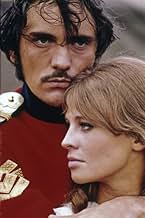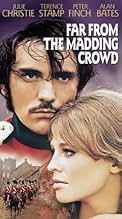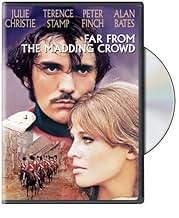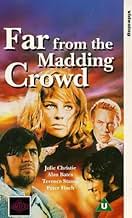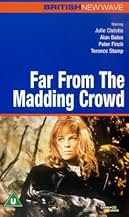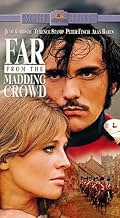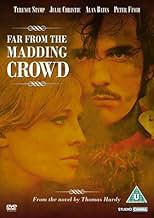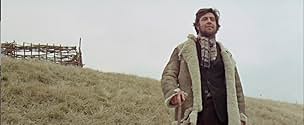IMDb RATING
7.2/10
6.6K
YOUR RATING
Bathsheba Everdene, a willful, flirtatious young woman, unexpectedly inherits a large farm and is romantically pursued by three very different men.Bathsheba Everdene, a willful, flirtatious young woman, unexpectedly inherits a large farm and is romantically pursued by three very different men.Bathsheba Everdene, a willful, flirtatious young woman, unexpectedly inherits a large farm and is romantically pursued by three very different men.
- Nominated for 1 Oscar
- 3 wins & 7 nominations total
- Director
- Writers
- All cast & crew
- Production, box office & more at IMDbPro
Featured reviews
In this sprawling adaptation of the Hardy novel, a beautiful woman in 19th century English countryside must select a suitor among three men. It has become fashionable to bash this film but it is quite an impressive production. Although she may not be exactly what Hardy had in mind, Christie is radiant as the heroine. The men pursuing her are well played by Finch as a rich landowner, Stamp as a cad, and especially Bates as a poor sheep farmer. Schlesinger's direction is leisurely and meticulous but he sustains interest despite the nearly three-hour length. The cinematography by Roeg is breathtaking and Bennett's score adds a haunting quality to the film.
"Far from the Madding Crowd" is one of a handful of elegantly produced, intelligent wide screen masterpieces which have sadly been neglected by those responsible for DVD. Fortunately, by early in 2009, Warner Brothers finally released it on a handsomely remastered standard DVD edition. There is no news of a Blu Ray version. It is richly scenic in an unusually stark, atmospheric way. Its cast is made up of some of the finest actors working at the time it was made. All of them handle their parts in this well-written, literate script, extremely well. Peter Finch, who seldom turned in a weak performance, is a standout in this film.
The great works of literary giants like Thomas Hardy invariably inspire strong opinions about film adaptations. It is no surprise to me that some reviewers were very critical of Far From the Madding Crowd, based on their feelings that it distorted aspects of the original novel. Despite such interpretive choices, or modifications as may be at play in this dramatization, the rewards of its many great strengths, in my opinion, make it a glorious viewing experience.
If you are a home theater buff with the technology needed to view this film on a fairly large screen, you will delight in its evocative wide screen splendor. It draws you into the very unique environment that was always so important in Thomas Hardy's writing. I am thrilled that such thoughtful epics as "Tess" and "Lord Jim" are all, at last, available in DVD release. "Far from the Madding Crowd" and David Lean's "Ryan's Daughter" are among those long awaited widescreen home entertainment selections which constitute the sublime highlights of any film library. They are visual masterpieces that cry out to be seen in such a high-resolution format as the DVD provides.
The great works of literary giants like Thomas Hardy invariably inspire strong opinions about film adaptations. It is no surprise to me that some reviewers were very critical of Far From the Madding Crowd, based on their feelings that it distorted aspects of the original novel. Despite such interpretive choices, or modifications as may be at play in this dramatization, the rewards of its many great strengths, in my opinion, make it a glorious viewing experience.
If you are a home theater buff with the technology needed to view this film on a fairly large screen, you will delight in its evocative wide screen splendor. It draws you into the very unique environment that was always so important in Thomas Hardy's writing. I am thrilled that such thoughtful epics as "Tess" and "Lord Jim" are all, at last, available in DVD release. "Far from the Madding Crowd" and David Lean's "Ryan's Daughter" are among those long awaited widescreen home entertainment selections which constitute the sublime highlights of any film library. They are visual masterpieces that cry out to be seen in such a high-resolution format as the DVD provides.
I have never read a good word about this film in any movie guide, which frankly baffles me. I think it's a masterpiece, and despite Hardy being one of my favourite authors, I think this is actually better than the novel. It also contains two absolutely perfect moments. But first some general comments. The photography is gorgeous, actually looking more realistic than idyllic, beautiful but sometimes cold and forboding, brooding over the tragic proceedings. Secondly, the remarkable soundtrack by Richard Rodney Bennett lends the movie a good deal of its emotiveness. The use of English folk songs to comment on the proceedings is ingenious, sometimes impressively reflective of the situations, and at points extremely unsettling.
Julie Christie is beautiful and I found her Bathsheba the precise mixture of headstrong independence and vulnerability. Terence Stamp's repulsive Troy is a triumph of casting and Alan Bates is wonderful as the simpliest of her suitors. The film is stolen for me though by Peter Finch, who begins a hat trick of devastating performances, here, in The Trials of Oscar Wilde and Sunday Bloody Sunday. His Boldwood is a remarkable creation, so eligible, so tragic, so lost and helpless. His scene with Bathsheba when she suggests Christmas to be a time when she will make a decision on their future is heartbreaking. "Christmas," he smiles. "I'm happier now." But the scene that should surely secure this movie a place in film history is that in the graveyard. Without spoling the plot for those who have yet to see it, the gargoyle spewing rainwater over the graves as the sound of "The Bold Grenadier" plays is as affecting an image as one is ever likely to see on screen. The Boldwood plot has a darker outcome here than in the book, which I'm sure Hardy would have approved of. This is a beautiful and disturbing movie that does not shy away from Hardy's bleak view of existence, and adds to the mix a strong sense of gritty 60s honesty. Beautiful, devastating and unforgettable.
Julie Christie is beautiful and I found her Bathsheba the precise mixture of headstrong independence and vulnerability. Terence Stamp's repulsive Troy is a triumph of casting and Alan Bates is wonderful as the simpliest of her suitors. The film is stolen for me though by Peter Finch, who begins a hat trick of devastating performances, here, in The Trials of Oscar Wilde and Sunday Bloody Sunday. His Boldwood is a remarkable creation, so eligible, so tragic, so lost and helpless. His scene with Bathsheba when she suggests Christmas to be a time when she will make a decision on their future is heartbreaking. "Christmas," he smiles. "I'm happier now." But the scene that should surely secure this movie a place in film history is that in the graveyard. Without spoling the plot for those who have yet to see it, the gargoyle spewing rainwater over the graves as the sound of "The Bold Grenadier" plays is as affecting an image as one is ever likely to see on screen. The Boldwood plot has a darker outcome here than in the book, which I'm sure Hardy would have approved of. This is a beautiful and disturbing movie that does not shy away from Hardy's bleak view of existence, and adds to the mix a strong sense of gritty 60s honesty. Beautiful, devastating and unforgettable.
I first saw this movie in 1968 when I was 14 as an assignment for school. The other day I saw it again late one Saturday night on my local PBS station. I remembered how entranced I was in the mood and the music, and that was still the same now. The movie was nominated for a Golden Globe as best picture(drama) and it won for best score.
But after living for 30 years I really see it as a great story about the relationship choices we make in life. It really made me reflect on my own choices in life.
The main character is played by Julie Christy age 26, who is the owner of a sheep farm in England. She is very beautiful and more than one man is in love with her. I won't say which man she marries but even after the movie was over I felt perplexed as to any one right outcome. That we all make choices at different times in our lives and sometimes the reasons are the same and sometimes they are different. Sometimes we make emotional choices and sometimes intellectual ones. But they are all choices we have to live with.
But after living for 30 years I really see it as a great story about the relationship choices we make in life. It really made me reflect on my own choices in life.
The main character is played by Julie Christy age 26, who is the owner of a sheep farm in England. She is very beautiful and more than one man is in love with her. I won't say which man she marries but even after the movie was over I felt perplexed as to any one right outcome. That we all make choices at different times in our lives and sometimes the reasons are the same and sometimes they are different. Sometimes we make emotional choices and sometimes intellectual ones. But they are all choices we have to live with.
There's a man or two who've taken quite a shine, they want to be your love, eternally entwine, one's a shepherd who has nowt, the t'other carries lots of clout, but desires from your side, just don't align. Then a soldier takes a glance and your enraptured, taking all you have to give and you've been captured, you're in love, and now so happy, you get wed, it's rather snappy, that's when ties begin to break, becoming fractured. Soon the man who you have loved, leaves you in tears, as he vanishes, dissolves and disappears, opens a door for the rich neighbour, who wants to offer you his sabre, and is prepared to wait a while, a long six years.
Fabulous performances by some rather splendid actors in a tale that engages and engulfs.
Fabulous performances by some rather splendid actors in a tale that engages and engulfs.
Did you know
- TriviaThe problem from which the sheep were suffering when they broke out into the green field, is called "pasture bloat". They got into a field with immature legumes, such as alfalfa or clover. The food causes excessive gas production which inflates the sheeps' stomachs (rumen) and compresses their lungs so they can't breathe. Using a trocar to puncture the rumen and release the gas, as Gabriel did, is a lot messier than this film shows.
- GoofsThe Valentine's Day greeting card that Bathsheba sends to Mr. Boldwood is of a contemporary 1960s style.
- Quotes
Bathsheba Everdene: [to her workers] Don't anyone suppose that because I'm a woman, I don't understand the difference between bad goings-on and good. I shall be up before you're awake, I shall be afield before you're up, and I shall have breakfasted before you're afield. In short, I shall astonish you all.
- Alternate versionsFor the UK version, a cockfight had to be deleted to comply with that country's laws on animal cruelty on film, as stated in the Cinematograph Films (Animals) Act 1937.
- ConnectionsEdited into Soleil vert (1973)
- How long is Far from the Madding Crowd?Powered by Alexa
Details
Box office
- Budget
- $2,750,000 (estimated)
- Runtime
- 2h 48m(168 min)
- Aspect ratio
- 2.35 : 1
Contribute to this page
Suggest an edit or add missing content


